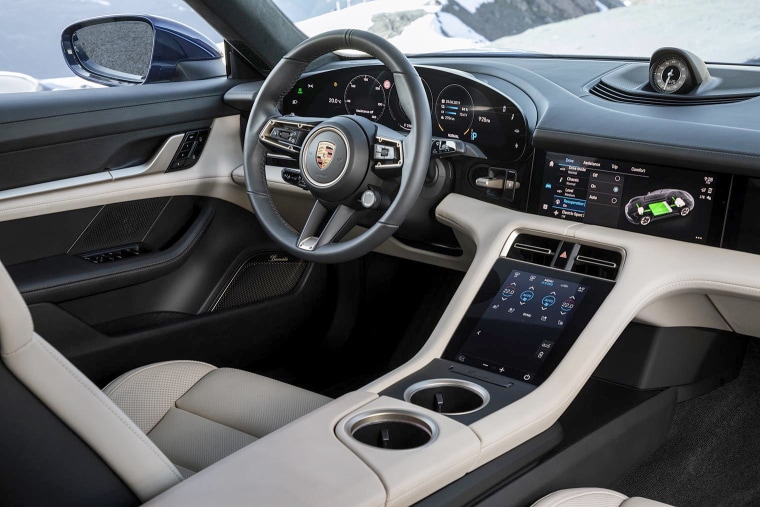Porsche is going electric. Four years after the company, best known for its high-performance sports cars, shocked the automotive world with its battery-powered Mission E concept vehicle, it formally unveiled the production version, dubbed the Taycan, at an event in Niagara Falls, Ontario.
On sale later this year, the Taycan Turbo base model will produce 670 horsepower, enough to hit 60 mph in 3 seconds. The Taycan Turbo S, which will be available in 2020, punches that up to 750 hp, and will hit 60 in just 2.6 seconds. Both all-wheel-drive models will be capable of a top speed of 161 mph.
The Taycan Turbo will retail for $150,000, with the Turbo S at $185,000 — much higher price points than the comparably equipped Tesla Model S, which has long been the industry standard.
“By 2025, we expect more than 50 percent of the vehicles we sell worldwide will have a plug, whether hybrid or all-electric,” said Klaus Zellmer, president and CEO of Porsche cars North America, during the Niagara Falls unveiling.
The Taycan and other Porsche battery-cars are part of a broader push by parent Volkswagen AG, which plans to introduce about 50 long-range all-electric models through its various brands by the middle of the coming decade. Its first, the e-tron, was launched earlier this year by the Audi brand.
Porsche’s push into battery power has some historical precedents. Company founder Ferdinand Porsche actually designed one of the world’s first plug-in hybrids as a young engineer more than a century ago. And, in more recent years, the company has used various forms of hybrid power in its race and street cars. But the Taycan is its first all-electric production model, and will be manufactured at an all-new plant in Zuffenhausen, Germany, not far from its headquarters.
Audi will work closely with Porsche on the development of high-end battery cars. The platform used for the Taycan will be shared with the next Audi model, the e-tron GT, due to market in two years.
Where early hybrids and battery-cars such as the Toyota Prius, Chevrolet Volt plug-in and all-electric Nissan Leaf focused on energy efficiency, the latest generation of all-electric vehicles is putting more of an emphasis on performance, taking advantage of the tire-spinning torque that electric motors can generate the moment they are switched on.
Porsche has signaled that the Taycan will get about 250 miles of range, though it is still waiting for formal numbers to be released by the EPA.
It will also be the first sports car capable of using the latest generation of Level 3 quick chargers, thanks to its new, 800-volt electrical system. Plugged into a 350 kilowatt public charging station, the Taycan will be able to “refill” 80 percent of its capacity in about 20 minutes.
As with those plug-based vehicles already on the market, however, Porsche officials said they expect owners to recharge at home or office more than 80 percent of the time. Though slower, that process means drivers would typically have a full charge most of the time.
Visually, the 2020 Porsche Taycan bears a strong resemblance to the automaker’s conventionally powered four-door model, the Panamera, though the goal was to give it the performance and handling of a classic 911 sports car, Stefan Weckbach, the project manager, told NBC News.
Inside, the Taycan’s cabin gives the classic Porsche design a high-tech touch, starting with the 16.8-inch digital instrument cluster. The dashboard features several additional touchscreens, as does the center console. And it's the first car to stream Apple Music directly through its infotainment system.
One of the key questions surrounding the launch of the Taycan is how it will be received by traditional Porsche buyers. The lack of the classic sports car engine “note” could take such customers by surprise, said Weckbach, though he believes it will be less of a challenge for younger buyers.
Sales of battery-electric vehicles has grown significantly over the last several years, though Tesla has been responsible for most of that surge. Overall, plug-based vehicles, including plug-in hybrids, still account for barely 2 percent of the overall U.S. motor vehicle market.
Several factors likely remain critical to popular acceptance, including the expansion of public charging facilities, the increase in battery range, and the availability of more all-electric products. The three models Porsche has coming will join dozens of other BEVs automakers are planning to debut over the next three years.
